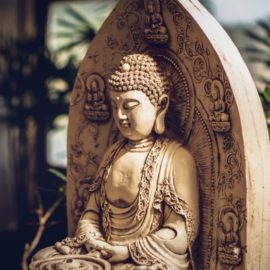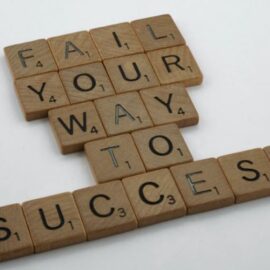

This article is an excerpt from the Shortform book guide to "The Monk Who Sold His Ferrari" by Robin Sharma. Shortform has the world's best summaries and analyses of books you should be reading.
Like this article? Sign up for a free trial here .
What does a lighthouse symbolize in The Monk Who Sold His Ferrari? How is a lighthouse purpose symbolized?
In The Monk Who Sold His Ferrari, Dharma is also known as the lighthouse of purpose. Like a lighthouse, your purpose or Dharma are guiding you along your way.
Read more about how to find your Dharma and establish your lighthouse of purpose.
Establish Your Lighthouse: Purpose or Dharma
Searching for your Dharma carries the risk that you’ll realize you are unhappy in your current life. However, learning more about yourself and why you are here should never be considered a risk. It is important to have a lighthouse of purpose.
Finding your Dharma begins—but does not end—with setting goals. Goals are the first step on the path to purpose, and you can’t reach a goal without knowing what it is; just like you can’t hit a target you can’t see. Raman demonstrated this point for Julian by trying to hit a small target while blindfolded. Despite being an extremely skilled archer, he missed badly.
People want happiness and fulfillment, but they won’t take even a few minutes to find their targets. It is not enough to want to “feel better” or “be happy.” Your goals must be clear and specific.
If you want to improve your quality of life (internal or external), you should immediately take a piece of paper and write down some specific long-term goals. Writing down goals helps sort through the clutter of your 60,000 daily thoughts and mark the relevant ones as more important than the others, which will help you focus your energy. Julian’s Dharma, for example, is to selflessly serve others. Many of his goals relate to that overall purpose.
At this point, John becomes depressed at the thought of dying without ever discovering that he had some special talent he could have used to improve people’s lives. He thinks back to his youth and remembers that he used to be a talented and passionate painter, before being lured in by the promised stability of Law. He reminisces about how he used to lose track of time while painting, and compares the feeling to being in Heaven.
Julian tells him this is the power of focusing your mind on something you love. He suggests that maybe painting beautiful pictures for people to enjoy is John’s Dharma, and says John should explore that idea by spending some time painting every single day.
John now questions whether his goals can be smaller and more practical, such as losing weight. He learns that there’s nothing wrong with setting many small goals on the way to larger aims, and in fact small steps are the best way to get started.
Reaching Your Goals
After establishing the lighthouse, purpose, or Dharma, you have to set goals to get where you want to go. The Sages’ five-step process for realizing goals:
- Clearly visualize the goal. In John’s case this means taking a moment every day, right after waking up, to picture himself lean and fit, full of strength and energy.
- Create positive pressure for yourself. This does not mean to badger or berate yourself—that would be negative pressure—but to somehow add some stakes to your goal that encourage you to pursue it. One method is to publicly announce your goal.
That instantly puts pressure on you to fulfill it, since now people will be watching you.
- Create a timeline for your goal. Having a deadline will help keep you on track. Commit the goal and the deadline to paper. A goal that is only in your mind is no goal at all.
- Choose a specific action or behavior that will help reach your goal, and do it every day for 21 days. This is how long it takes for new habits to be formed, and bad habits to be replaced. It’s recommended that you do the action or behavior at the same time each day. There is great power in ritual.
- Enjoy the process. Have fun while pursuing your goals; if your new ritual feels like a terrible chore you won’t stick to it. This applies to all aspects of life, not just goal-setting. Remember: A day without laughter or love is a day wasted.
One useful tool to help find your Dharma is a Dream Book. Buy a cheap notebook, and fill it with goals and dreams from all areas of your life. Divide your Dream Book into sections based on what type of goal you’re adding: fitness, financial, relationship, spiritual, and so on.
Also fill the Book with pictures of what you want and people who have achieved those things. If your goal is to get in better shape, perhaps include a picture of a superstar athlete. This Dream Book will help you to learn more about yourself and discover where your passions lie.
Dharma is rooted in passion, so always keep the word “passion” at the front of your mind. It is the most powerful fuel in the world. Do things because you want to, because you are passionate about them; never do something just because you think you have to. You are the master of your own fate. Starting right now, take control of your own life and put passion into everything that you do. Use your lighthouse of purpose to make sure you stay the course.

———End of Preview———
Like what you just read? Read the rest of the world's best book summary and analysis of Robin Sharma's "The Monk Who Sold His Ferrari" at Shortform .
Here's what you'll find in our full The Monk Who Sold His Ferrari summary :
- Why your career success might actually be killing you
- How to live a simple and fulfilling life
- The 10 rituals you should practice for health and healing






